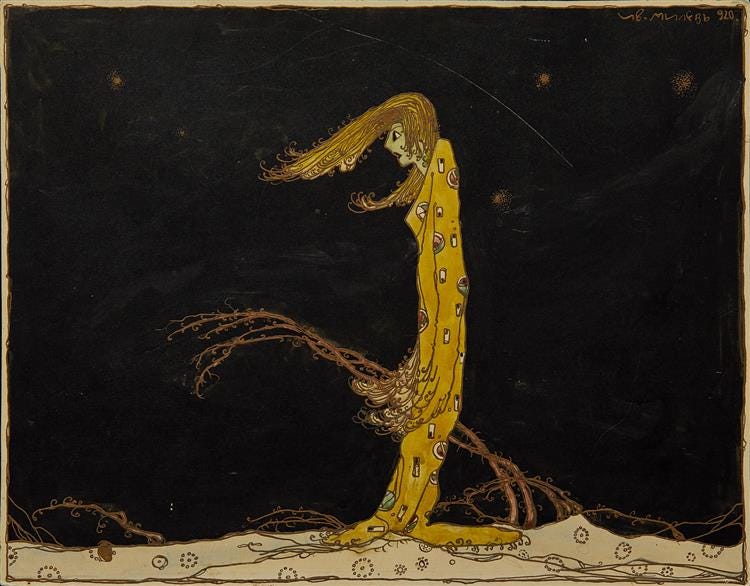Тhe rosary of my human days
Is coming unstrung, has come unstrung.
Slipping unstoppable
Through my weary fingers,
Are its black and white beads.
And it’s all the same -
light or heavy,
empty or full,
It’s all the same.
They will be swallowed up
Bead by bead
By the unsolved mystery
Of eternal infinity...
Yes, I am sad -
As anyone headed toward
the end...
But I do not rebel,
Nor am I afraid -
I am grateful:
I was born and I lived on this
Millennial land of ours.
And the sun warmed me
And I tasted her sweetest,
and her most bitter fruit...
And I have rejoiced, and I have suffered much -
yet I never cursed thee,
I blessed thee instead -
Life!
1915
ВЕЧЕРНА ПЕСЕН
Елисавета Багряна
Изнизва се, изнизва броеницата
на дните ми човешки.
Търкулват се неудържими
от пръстите ми отмалели
зърната черно-бели.
И все едно -
били те леки или тежки,
празни или пълни,
все едно -
ще ги погълне
зърно подир зърно
в неразгаданата си тайна
вечната безкрайност...Да, тъжно ми е -
както всекиму, поел към края...
Но не роптая,
не се и плаша -
благодаря:
Родих се и живях на тази наша
хилядолетница земя.И слънцето ме гря
и вкусих и най-сладкия,
и най-горчивия й плод...
И радвах се, и много страдах -
но никога не те проклех,
а благославях те -
Живот!
Three-time Nobel laureate Elisaveta Bagryana (1893-1991) is one of the most accomplished poets in Bulgarian history. ‘Evening Song’ is the writer’s first published poem. It condenses the principal theme of her poetic oeuvre as a totality—her unwavering love for life. Most of all, ‘Evening Song’ reveals Bagryana’s understanding of life’s brevity. This fuels her love for experiencing life in all its aspects: from joy to pain, and everything in between. In this translation, I have attempted to keep the original meter of the poem, although this has not always been possible. The initial positioning of the lines, however, is intact. Bagryana’s language is fragmented, in line with the trends in Bulgarian modernist poetry of the time, informed mainly by German and French poetic theory. The poem also reflects another persistent theme in her work—the relationship to the native land. When she says ‘this millennial land’, she means the geographical entity of her homeland. This is linked to Bagryana’s continued poetic attempts to understand her own roots and her relationship to her ancestors. Paradoxically, this attempt to place herself within a specific history is contrasted by her lifelong quest for freedom. Bagryana refused to be moulded into the categories of a mother and wife—she was the femme fatale of the cultural elite. As the first public expression of her poetic voice, ‘Evening Song’ suggests the presence of the longings that would define not simply the rest of Bagryana’s work, but most of all her long and vivid life.




